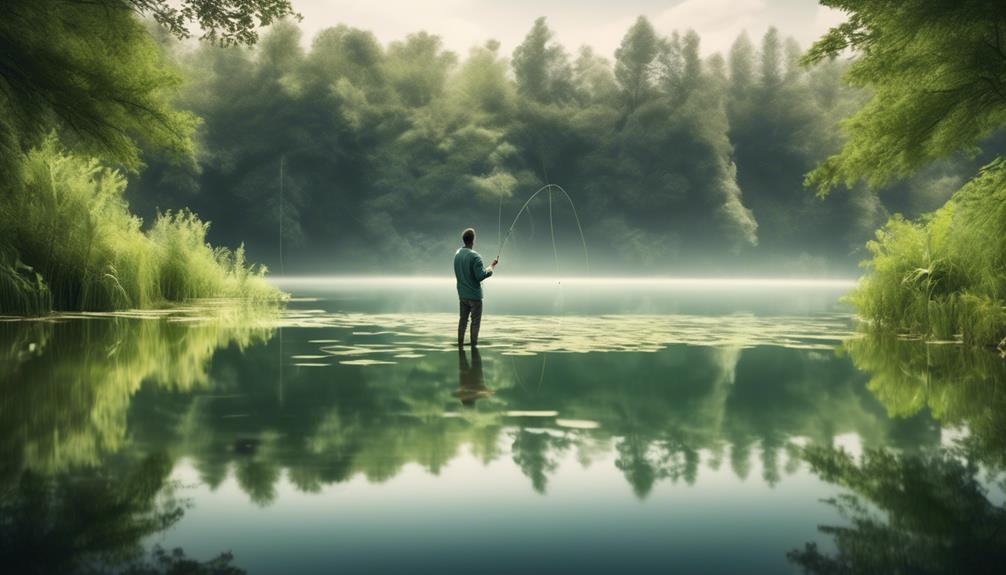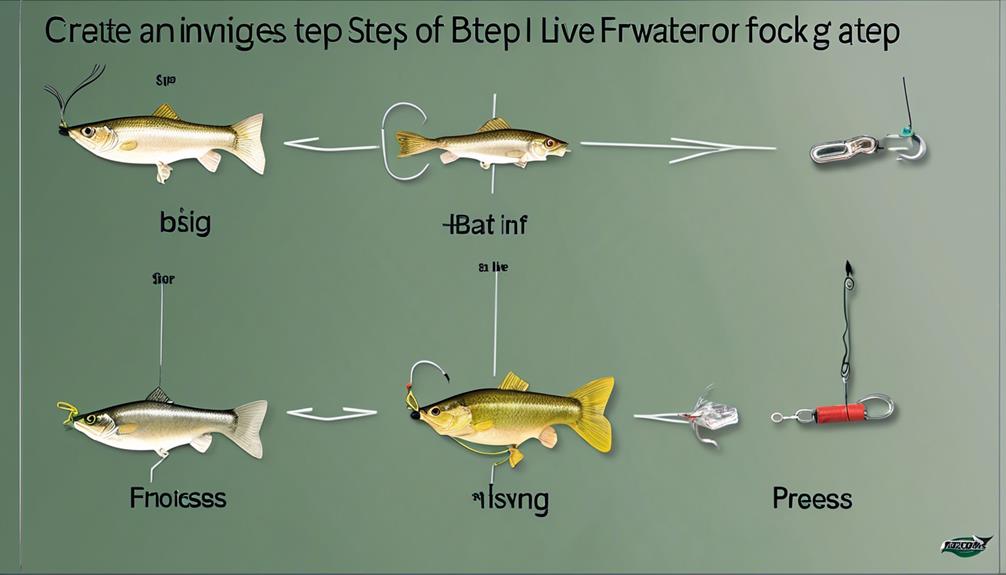Do you know that over 90% of freshwater fish are more active and responsive to bait at night?
It may seem counterintuitive, but the cover of darkness actually works in your favor when it comes to freshwater fishing.
The reasons behind this heightened productivity are not only fascinating but also crucial for any angler looking to improve their catch rate.
Understanding the unique behaviors of nocturnal fish and the strategies for effectively targeting them at night can significantly enhance your fishing experience.
So, what makes night-time freshwater fishing so much more productive than fishing during the day?
Understanding Nocturnal Fish Behavior
To improve your night-time freshwater fishing productivity, understanding the nocturnal behavior of fish is essential. Fish activity during the night is influenced by various factors, with one of the most significant being the moon phases. The moon greatly impacts the behavior of fish, as it affects their feeding patterns and movement. Understanding how moon phases influence fish behavior can significantly enhance your fishing success.
During the full moon, fish tend to be more active and visible, making it an ideal time for night fishing. The increased light during this phase allows fish to see more clearly, making it easier for them to hunt for prey. On the other hand, during the new moon, when the night is darker, fish may be more cautious and less active. They may seek shelter in darker areas, making them more challenging to catch.
Knowing how moon phases affect fish behavior can help you plan your night fishing trips more effectively. For instance, during the full moon, you might want to focus on using topwater lures to take advantage of the increased fish activity near the water's surface. In contrast, during the new moon, you may need to adjust your tactics by using deeper-running lures or bait to entice the more cautious fish hiding in darker areas.
Selecting the Right Night Fishing Gear
Select the appropriate night fishing gear based on the specific conditions of your fishing location and the targeted fish species. When heading out for a night fishing adventure, it's crucial to have the right gear to ensure a successful and enjoyable experience.
Here are some key items to consider:
- Night Vision Headlamp: Enhance your visibility and maintain your night vision with a quality headlamp. This won't only help you navigate in the dark but also assist with baiting hooks, changing lures, and handling your catch without fumbling in the darkness.
- High-Visibility Fishing Line: Opt for a high-visibility fishing line that's easier to track in low light conditions. This will enable you to detect subtle bites and movements, increasing your chances of hooking the elusive night-time fish.
- Comfortable Clothing: Dress for the weather and ensure your clothing is comfortable for extended periods. Additionally, consider clothing with reflective elements for added safety if you'll be fishing near or on the water.
- Tackle Selection: Choose lures and baits that are known for their effectiveness at night. Dark-colored lures or those with rattles and vibrations can attract fish in low light conditions, increasing your chances of a successful catch.
Identifying Optimal Night Fishing Spots
As you prepare your night fishing gear, ensuring you have selected the appropriate equipment for low light conditions, it's essential to identify optimal spots for your night-time freshwater fishing excursion.
When it comes to identifying these spots, considering the moon phase is crucial. The moon phase can significantly impact fish behavior, with many species being more active during certain lunar cycles. For instance, during a full moon, fish may be more active and visible near the surface, making it an ideal time for night fishing. On the other hand, during a new moon, when it's darker, fish may be more inclined to venture into shallower waters, making it another optimal time for night fishing. Therefore, being aware of the moon phase can help you pinpoint the best spots to maximize your catch.
Another important factor to consider when identifying optimal night fishing spots is ambient noise. Fish are sensitive to vibrations and sound, and excessive noise can spook them, making it essential to find quiet and serene locations. Avoid areas with loud human activity, such as bustling boat docks or crowded picnic areas. Instead, look for secluded spots with minimal ambient noise, allowing you to fish undisturbed.
Additionally, try to choose locations where the water is relatively calm, as excessive waves and turbulence can also disrupt fish activity. By paying attention to these factors, you can pinpoint optimal night fishing spots that increase your chances of a successful freshwater fishing excursion.
Using Effective Night Bait and Lures
When night fishing, using bait and lures specifically designed for low light conditions can significantly enhance your chances of a successful catch. To maximize your productivity, consider the following tips:
- Choose high-contrast colors: Opt for lures and baits in colors like black, purple, or chartreuse as they stand out in the darkness, making them more visible to fish.
- Utilize noise-producing lures: Select lures that create noise or vibration in the water, as fish rely heavily on their senses of hearing and feeling to locate prey in low light conditions.
- Experiment with scented baits: Nighttime fishing often involves reduced visibility, so using baits with strong scents can help fish locate and strike your offering more easily.
- Use slow-moving lures: Fish are less active at night, so using slow-moving lures allows them more time to detect and react to your bait.
Mastering Night Fishing Techniques
To master night fishing techniques, understanding the behavior of nocturnal fish is essential for increasing your chances of a successful catch. One key factor to consider is the moon phase, as it significantly influences fish activity. During a full moon, fish are more active and tend to feed throughout the night, making it an ideal time for night fishing. Conversely, during a new moon, fish may be less active, making the fishing experience more challenging. Therefore, planning your night fishing trips around the lunar calendar can greatly enhance your success.
Artificial lighting is another crucial aspect of mastering night fishing techniques. Using underwater lights can attract baitfish, which in turn draws larger predatory fish. Additionally, having a reliable and powerful headlamp is essential for navigating in the dark and tying knots efficiently. When using artificial lighting, it's important to be mindful of the intensity and color of the light. Some fish are sensitive to bright lights and may be deterred, so using softer, warmer lights can be more effective.
In mastering night fishing techniques, patience and persistence are key. Night fishing requires a different approach and mindset compared to daytime fishing. By understanding the behavior of nocturnal fish, paying attention to the moon phase, and utilizing artificial lighting strategically, you can significantly improve your night fishing success.
Maximizing Visibility in the Dark
Mastering night fishing techniques involves not only understanding the behavior of nocturnal fish and the influence of the moon phase but also maximizing visibility in the dark to enhance your chances of a successful catch. When fishing in low light conditions, it's essential to make the most of the limited visibility to locate and attract fish effectively.
Here are some key strategies for maximizing visibility in the dark:
- Using lights: Utilizing high-quality, waterproof fishing lights can significantly improve visibility during night-time fishing. Submersible LED lights or floating lanterns not only illuminate the surrounding area but also attract insects, which in turn draw in the fish. The use of lights can create a captivating spectacle while aiding in spotting potential catches.
- Moon phases: Understanding the lunar cycle and its impact on fish behavior is crucial for successful night fishing. The moon's phase influences fish activity, with the full moon and new moon phases often being the most productive times for night fishing. During a full moon, the increased light can make it easier to see, while the reduced light during a new moon can make fish more active in search of prey.
- Reflective gear: Wearing clothing and accessories with reflective elements can enhance visibility and safety during night fishing. Reflective tape on fishing rods or wearing clothing with reflective patches can make it easier for you and others to spot each other in the dark, reducing the risk of accidents.
- Night vision technology: Utilizing night vision optics such as binoculars or monoculars can greatly improve visibility, allowing you to spot fish and navigate your surroundings with ease. Night vision devices amplify ambient light, making it possible to see clearly even in extremely low-light conditions.
Staying Safe During Night Fishing Trips

Ensure your safety during night fishing trips by being prepared and aware of potential risks. When it comes to nighttime navigation, it's crucial to have a reliable light source and to be familiar with the body of water you'll be fishing in. Prior to your trip, take the time to scout the area during the day, noting any potential hazards such as shallow water, submerged obstacles, or strong currents. Bring along a GPS or a map of the area to aid in navigation. It's also wise to inform someone of your plans and location, just in case of an emergency.
Wildlife encounters are a common concern during night fishing trips. In order to minimize the risk, make sure to keep your distance from the water's edge, as many animals come to the water to drink at night. Be aware of your surroundings and keep an eye out for any signs of wildlife. Additionally, it's advisable to carry bear spray or other deterrents if you're in an area known for bear or cougar activity. Being cautious and respectful of wildlife's natural habitat is essential for your safety.
Adapting to Nighttime Weather Conditions
When fishing at night, it's important to be prepared for changing weather conditions and to adapt your gear and clothing accordingly. Nighttime fishing can be an exhilarating experience, but it's crucial to be ready for the challenges that the nighttime weather may bring.
Here are some essential tips to help you adapt to nighttime weather conditions:
- Layer Up: The temperature can drop significantly at night, so wearing multiple layers of clothing can help you stay warm and comfortable throughout your fishing trip.
- Waterproof Gear: Nighttime dew or light rain can be common occurrences. Ensure that your clothing and gear are waterproof to stay dry and avoid discomfort.
- Night Vision Equipment: Invest in night vision equipment such as specialized goggles or headlamps. This won't only aid in seeing better in the dark but also in navigating your surroundings safely.
- Reflective Clothing: Wearing clothing with reflective elements can enhance your visibility to other anglers and boaters, reducing the risk of accidents in low-light conditions.
Adapting to nighttime weather conditions is vital for a successful and safe fishing experience. By being prepared with the right clothing and gear, you can fully enjoy the unique challenges and rewards that come with nighttime freshwater fishing.
Frequently Asked Questions
What Are the Best Types of Food Sources for Freshwater Fish at Night?
At night, freshwater fish are drawn to food sources like insects, small fish, and crustaceans. Their night time feeding habits make live bait like worms or minnows more effective than artificial lures for attracting bites.
How Does the Lunar Cycle Affect Freshwater Fish Behavior at Night?
During the lunar phases, freshwater fish behavior at night can be affected. The moon's brightness can influence night time feeding and fish activity. Understanding the lunar cycle can help you plan your freshwater fishing trips for better success.
Are There Specific Regulations or Restrictions for Night-Time Freshwater Fishing in Certain Areas?
When night fishing in freshwater, it's important to check local regulations and restrictions. Some areas may have specific rules, like requiring a fishing license, limiting hours, or banning certain equipment. Always prioritize safety and bring proper gear.
What Are the Most Common Mistakes Anglers Make When Fishing at Night?
When fishing at night, common mistakes include not using proper equipment, using the wrong bait, and not considering ideal conditions. To improve your chances, ensure you have the right gear, bait, and fish during prime conditions.
How Can Anglers Minimize Their Impact on the Environment While Fishing at Night?
To minimize disturbances and conserve the environment while fishing at night, you should use non-toxic bait, practice catch and release, and avoid excessive artificial lighting that can disrupt the natural habitat of aquatic life.
Conclusion
So, next time you're considering a fishing trip, don't overlook the potential of night-time freshwater fishing. With the right gear, knowledge of fish behavior, and some patience, you can significantly increase your chances of catching more fish.
Remember to stay safe, be prepared for the dark, and adapt to the nighttime conditions. Embrace the challenge and excitement of night fishing, and you may just reel in some impressive catches.
Happy fishing!



